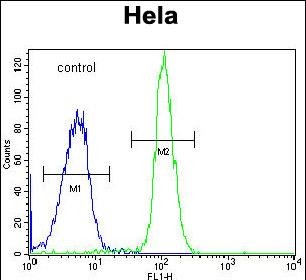ADPRHL2 Antibody (N-term)
Affinity Purified Rabbit Polyclonal Antibody (Pab)
- SPECIFICATION
- CITATIONS
- PROTOCOLS
- BACKGROUND

Application
| FC, WB, E |
|---|---|
| Primary Accession | Q9NX46 |
| Reactivity | Human |
| Host | Rabbit |
| Clonality | Polyclonal |
| Isotype | Rabbit IgG |
| Calculated MW | 38947 Da |
| Antigen Region | 87-114 aa |
| Gene ID | 54936 |
|---|---|
| Other Names | Poly(ADP-ribose) glycohydrolase ARH3, ADP-ribosylhydrolase 3, [Protein ADP-ribosylarginine] hydrolase-like protein 2, ADPRHL2, ARH3 |
| Target/Specificity | This ADPRHL2 antibody is generated from rabbits immunized with a KLH conjugated synthetic peptide between 87-114 amino acids from the N-terminal region of human ADPRHL2. |
| Dilution | FC~~1:10~50 WB~~1:1000 E~~Use at an assay dependent concentration. |
| Format | Purified polyclonal antibody supplied in PBS with 0.09% (W/V) sodium azide. This antibody is purified through a protein A column, followed by peptide affinity purification. |
| Storage | Maintain refrigerated at 2-8°C for up to 2 weeks. For long term storage store at -20°C in small aliquots to prevent freeze-thaw cycles. |
| Precautions | ADPRHL2 Antibody (N-term) is for research use only and not for use in diagnostic or therapeutic procedures. |
| Name | ADPRS (HGNC:21304) |
|---|---|
| Function | ADP-ribosylhydrolase that preferentially hydrolyzes the scissile alpha-O-linkage attached to the anomeric C1'' position of ADP- ribose and acts on different substrates, such as proteins ADP- ribosylated on serine and threonine, free poly(ADP-ribose) and O- acetyl-ADP-D-ribose (PubMed:21498885, PubMed:29907568, PubMed:30045870, PubMed:30401461, PubMed:30830864, PubMed:33186521, PubMed:33769608, PubMed:33894202, PubMed:34019811, PubMed:34321462, PubMed:34479984, PubMed:34625544). Specifically acts as a serine mono-ADP- ribosylhydrolase by mediating the removal of mono-ADP-ribose attached to serine residues on proteins, thereby playing a key role in DNA damage response (PubMed:28650317, PubMed:29234005, PubMed:30045870, PubMed:33186521, PubMed:34019811, PubMed:34625544). Serine ADP- ribosylation of proteins constitutes the primary form of ADP- ribosylation of proteins in response to DNA damage (PubMed:29480802, PubMed:33186521, PubMed:34625544). Does not hydrolyze ADP-ribosyl- arginine, -cysteine, -diphthamide, or -asparagine bonds (PubMed:16278211, PubMed:33769608). Also able to degrade protein free poly(ADP-ribose), which is synthesized in response to DNA damage: free poly(ADP-ribose) acts as a potent cell death signal and its degradation by ADPRHL2 protects cells from poly(ADP-ribose)-dependent cell death, a process named parthanatos (PubMed:16278211). Also hydrolyzes free poly(ADP-ribose) in mitochondria (PubMed:22433848). Specifically digests O-acetyl-ADP-D-ribose, a product of deacetylation reactions catalyzed by sirtuins (PubMed:17075046, PubMed:21498885). Specifically degrades 1''-O-acetyl-ADP-D-ribose isomer, rather than 2''-O-acetyl- ADP-D-ribose or 3''-O-acetyl-ADP-D-ribose isomers (PubMed:21498885). |
| Cellular Location | Nucleus. Cytoplasm. Chromosome Mitochondrion matrix Note=Recruited to DNA lesion regions following DNA damage; ADP-D- ribose-recognition is required for recruitment to DNA damage sites |
| Tissue Location | Ubiquitous (PubMed:16278211). Expressed in skin fibroblasts (PubMed:30830864). |

Thousands of laboratories across the world have published research that depended on the performance of antibodies from Abcepta to advance their research. Check out links to articles that cite our products in major peer-reviewed journals, organized by research category.
info@abcepta.com, and receive a free "I Love Antibodies" mug.
Provided below are standard protocols that you may find useful for product applications.
Background
ADPRHL2 is a member of the ADP-ribosylglycohydrolase family. The enzyme catalyzes the removal of ADP-ribose from ADP-ribosylated proteins. This enzyme localizes to the mitochondria, in addition to the nucleus and cytoplasm.
References
Niere, M., et al. Mol. Cell. Biol. 28(2):814-824(2008)
Ono, T., et al. Proc. Natl. Acad. Sci. U.S.A. 103(45):16687-16691(2006)
Mueller-Dieckmann, C., et al. Proc. Natl. Acad. Sci. U.S.A. 103(41):15026-15031(2006)
If you have used an Abcepta product and would like to share how it has performed, please click on the "Submit Review" button and provide the requested information. Our staff will examine and post your review and contact you if needed.
If you have any additional inquiries please email technical services at tech@abcepta.com.













 Foundational characteristics of cancer include proliferation, angiogenesis, migration, evasion of apoptosis, and cellular immortality. Find key markers for these cellular processes and antibodies to detect them.
Foundational characteristics of cancer include proliferation, angiogenesis, migration, evasion of apoptosis, and cellular immortality. Find key markers for these cellular processes and antibodies to detect them. The SUMOplot™ Analysis Program predicts and scores sumoylation sites in your protein. SUMOylation is a post-translational modification involved in various cellular processes, such as nuclear-cytosolic transport, transcriptional regulation, apoptosis, protein stability, response to stress, and progression through the cell cycle.
The SUMOplot™ Analysis Program predicts and scores sumoylation sites in your protein. SUMOylation is a post-translational modification involved in various cellular processes, such as nuclear-cytosolic transport, transcriptional regulation, apoptosis, protein stability, response to stress, and progression through the cell cycle. The Autophagy Receptor Motif Plotter predicts and scores autophagy receptor binding sites in your protein. Identifying proteins connected to this pathway is critical to understanding the role of autophagy in physiological as well as pathological processes such as development, differentiation, neurodegenerative diseases, stress, infection, and cancer.
The Autophagy Receptor Motif Plotter predicts and scores autophagy receptor binding sites in your protein. Identifying proteins connected to this pathway is critical to understanding the role of autophagy in physiological as well as pathological processes such as development, differentiation, neurodegenerative diseases, stress, infection, and cancer.



